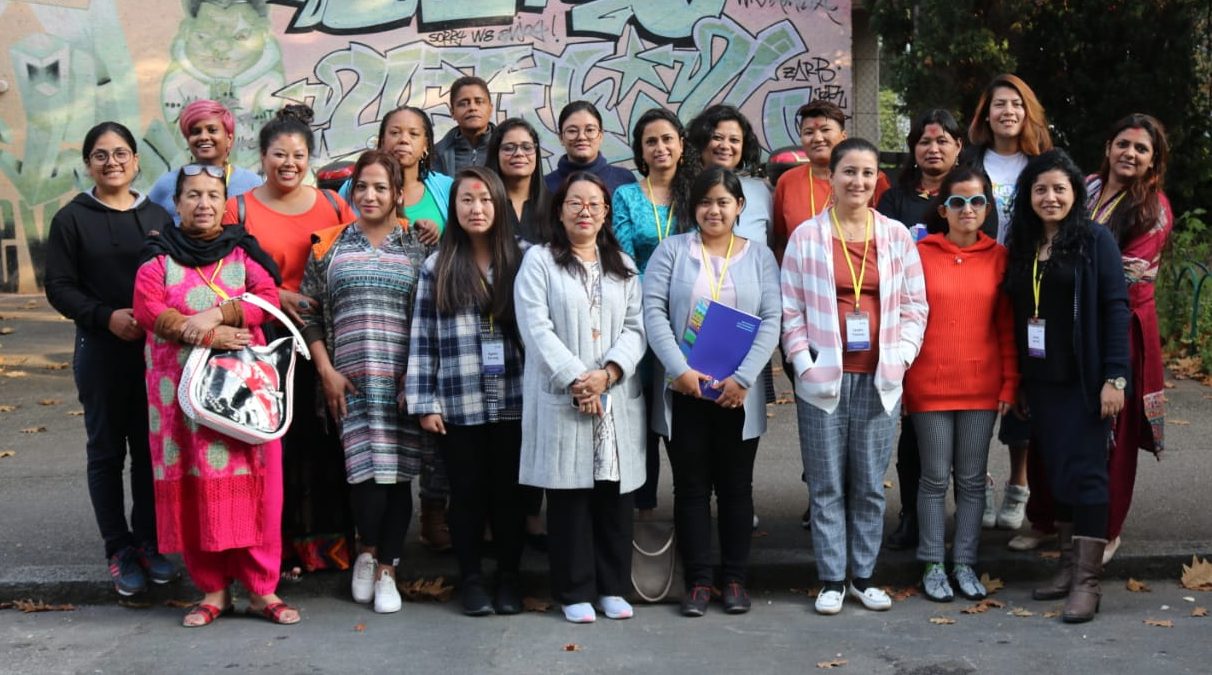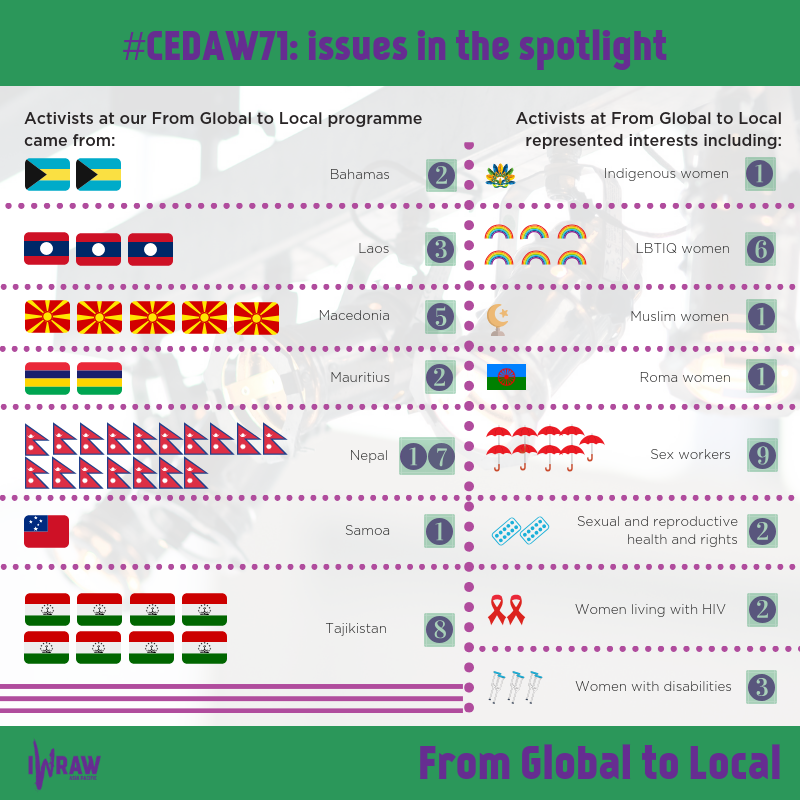
Activists at IWRAW Asia Pacific’s From Global to Local training programme, Geneva, October/November 2018.
The 71st session of the Convention on the Elimination of All Forms of Discrimination against Women (CEDAW) took place from 22 October to 9 November 2018 at the United Nations in Geneva, Switzerland, during which the CEDAW committee carried out constructive dialogues with eight member states: Bahamas, Congo, Lao PDR, Macedonia, Mauritius, Nepal, Samoa and Tajikistan.
Overview
#CEDAW71 saw an overwhelming and vibrant presence of activists from all eight reporting countries. Their concerted advocacy provided the Committee with alternative information about the situation of women’s rights in their countries.
Over 100 activists attended from Nepal, representing very diverse constituencies and highlighting multiple issues. It was also the first time in Mauritius’ history at CEDAW that a non-governmental organisation took the floor and presented a shadow report.
Groups represented at #CEDAW71 included indigenous women, women with disabilities, Dalit women, lesbian, bisexual and transgender women, intersex people, sex workers, women living with HIV, and Roma women. The girl-led shadow report from Nepal, prepared by 527 girls, 110 boys and two members of sexual minorities, representing all seven provinces of the country, was put together through a series of consultations and also incorporated creative writing.
During the CEDAW session, outgoing Committee member Patricia Schulz took the time to acknowledge and commend the contributions of civil society to the CEDAW process: “I would like to thank you for your efforts, for your courage, your persistence, your activism.”
From Global to Local
Our observation of the constructive dialogues was preceded by the delivery of our flagship training programme, From Global to Local, which demystifies the CEDAW process and empowers activists to engage with it.
Prominent Themes
As always, the CEDAW committee’s constructive dialogues with member states covered a wide range of thematic areas, many of which cut across all or most of the countries reviewed. These are some that stood out for us.
Status of Women Human Rights Defenders (WHRDs) and Space for Civil Society
When activists – primarily women – provide alternative information to the CEDAW committee, they do so at varying degrees of risk to their personal safety and wellbeing, as well as to the security of their institutions. The level of risk depends on the space for civil society in their countries. The committee encourages WHRDs to additionally share information on what enables and what curbs their ability to carry out their work effectively and without fear of violence, backlash or criminalisation. This includes anything that happens before, during or after their engagement with the CEDAW review.
The committee’s questions on the status of WHRDs were framed in many different ways during #CEDAW71, including reference to laws and policies that restrict space for civil society or have a chilling effect, such as the proposed National Integrity Policy of Nepal and the Decree on Associations (No. 238 of 2017) of Laos; restrictions on the rights to freedom of association, freedom of opinion and expression; and restrictions on funding for NGOs. Following the session, the committee, along with other UN human rights experts, issued a statement to mark International Women Human Rights Defenders Day on 29 November, calling for states to live up to their commitments to protect WHRDs.
Equal Pay for Work of Equal Value
Several states – Congo, Laos, Macedonia, Mauritius and Nepal – mentioned that they apply the principle of equal pay for work of equal value, but when questioned about how they operationalise it, including through legislation, the answers were not clear or straightforward. It was apparent that the principle is not fully developed in the countries and seems to stop at equal pay for the same work, rather than addressing segregation of work or how women are concentrated in low-paying jobs, often in the informal sector.
Definition of Discrimination
While non-discrimination is one of the three interrelated core principles of the convention, the questions posed by the committee during the constructive dialogues are a constant reminder that the application of this principle requires not just prohibition of discrimination on the basis of sex, but also unpacking what intersectional and multidimensional non-discrimination means, by providing a comprehensive definition of discrimination. The committee asked states to provide a definition of sex-based discrimination, including direct and indirect discrimination, in either the constitution or national legislation, and noted that measures to systematically and intersectionally address gender inequality must be linked to such definitions.
Extraterritorial Obligations (ETOs)
Once again, the CEDAW committee raised issues around the ETOs of countries under review, this time focused on the status of the Bahamas and Mauritius as tax havens. Government representatives from the Bahamas, when asked how the state ensures that its laws on tax havens don’t impede the rights of women in other countries, responded that its international legal division monitors tax issues and money laundering, and is linked to international programmes on transparency and exchange of information. The committee highlighted the two-percent profit paid by companies registered in Mauritius to a Corporate Social Responsibility (CSR) Fund, asking about measures taken to assess its effectiveness, and how it advanced women’s human rights.
Temporary Special Measures (TSMs)
On multiple occasions the committee highlighted the need for member states to clarify the purpose of TSMs, effectively implement them and monitor their effectiveness. As Mauritius’ Equal Opportunity Act does not include provision for the adoption of TSMs, state representatives were asked what efforts would be made to improve the understanding of them. Macedonia’s present law on equal opportunity provides special measures, but the committee noted that TSMs as per the Convention require much more proactive measures. The committee made clear that TSMs should not be tokenistic – they need to address historical inequalities and intersectional issues. It was recommended to have memoranda of understanding in place with different sectors, such as industry, transport, water, sanitation, etc., to help institutionalise TSMs.
Concluding Observations
Key priority recommendations from the 71st CEDAW session’s Concluding Observations, by country:
Bahamas
• Constitutional reform with inclusive participation of civil society
• Expand constitutional protection to include gender- and sex-based discrimination
• Effective functioning of national machineries in all branches and on all levels of government
• Adopt a comprehensive draft bill and strategy on gender-based violence
• Enforce the Trafficking in Persons Act and increasing financial resources and programmes
Congo
• Reform and adopt the Civil Code, the Personal and Family Code, and the Penal Code, in favour of the rights of women
• Expedite the process of adoption of the draft law and strategy on gender-based violence and on equality in marriage and family
Lao PDR
• Eliminate discriminatory stereotypes that impede girls’ access to education
• Collect disaggregated data on unsafe abortion and its impact on women’s health
• Increase the access of rural women, young women, women heads of households and women with disabilities to education, health and economic activities
Macedonia
• Adopt law on prevention and protection against discrimination
• Ensure protection on the basis of sex and from multiple and intersecting discrimination
• Strengthen the mandate, capacity, authority and resource allocation of the department of equal opportunities
• Establish commissions for equal opportunities
Mauritius
• Accelerate the full and equal participation of women in political and public life by putting in place Temporary Special Measures
• Prohibit marital rape and corporal punishment through law amendment/adoption
• Amend the Civil Code and Child Protection Act to define a person under 18 years of age as a child and preclude marriage below that age
• Strengthen disaggregated data collection systems, particularly in areas of GBVAW, child marriage, adolescent pregnancies, etc.
Nepal
• Amend/repeal all discriminatory provisions in the constitution which relate to nationality
• Protect the rights of women in unregistered marriages by providing mandatory registration of all marriages
• Eradicate child marriage
Samoa
• Combat all forms of gender based violence by undertaking comprehensive study on the social, health, psychosocial and economic costs of GBVAW
• Amend the Electoral Act and legislative measures
• Introduce measures, including Temporary Special Measures, to accelerate the full and equal participation of women in political and public life
Tajikistan
• Criminalise all forms of gender-based violence, including sexual assault, domestic violence, and marital rape
• Eliminate negative stereotypes and barriers in the education sector by providing career counselling in non-traditional sector and providing Temporary Special Measures
• Promote marriage registration and the removal from the Family Code of the mandatory check-up requirement prior to contracting marriage
Committee News
This was Dalia Leinarte’s last session as chair, and there were additionally seven outgoing members of the committee: Ayse Feride Acar from Turkey, Magalys Arocha Dominguez from Cuba, Ruth Halperin-Kaddari from Israel, Yoko Hayashi from Japan, Lilian Hofmeister from Austria, Ismat Jahan from Bangladesh and Patricia Schulz from Switzerland. We look forward to welcoming the seven incoming members in 2019.
Anganile Mwenifumbo was appointed Secretary a.i. of CEDAW, and we thank former secretary Jakob Schneider for his valued work.
IWRAW Asia Pacific Side Event at the 71st CEDAW Session
We additionally held a side event – a discussion titled ‘The Legal, Political and Moral Imperative of Grounding Development Priorities in Women’s Human Rights’. This event recognised that while we need to critically analyse the political economy of the SDGs, we must also reinforce that achieving gender equality, women’s empowerment and human rights are autonomous ends in themselves and are not simply instruments to achieve economic growth or development. This is why it is crucial that women’s rights organisations, as well as treaty bodies, UN agencies, states and national human rights institutions, play a key role in the continuing process of finetuning the 2030 Agenda and ensuring the goals are implemented without undermining existing gains made in enforcing women’s human rights. Our panel comprised Marcia Canario, Second Secretary of the Permanent Mission of Brazil to the United Nations in Geneva; Nahla Haidar, CEDAW Committee member and a member of the Committee’s SDG Working Group; Francesca Thornberry, Strategic Advisor, Danish Institute for Human Rights; and Sachini Perera, Programme Officer, IWRAW Asia Pacific.
The event also celebrated the work of the CEDAW Committee, giving special thanks to its outgoing members. And our side event additionally marked 25 years of IWRAW Asia Pacific’s feminist activism, as an organisation founded with the idea of amplifying voices of women, especially women from the Global South, and using the CEDAW review process as an important opportunity to name, recognise, claim and assert our rights.
Upcoming Dates
NGOs from the following countries should note the relevant dates from the CEDAW calendar, and contact us if they have plans or queries regarding engagement with their country’s review.
72nd session: 18 February to 8 March 2019
1) Angola
2) Antigua and Barbuda
3) Botswana
4) Colombia
5) Ethiopia
6) Serbia
7) United Kingdom of Great Britain and Northern Ireland
The 72nd session will also include a half-day of general discussion on trafficking in women and girls in the context of global migration.
Pre-session working group for the 74th session: 11 to 15 March 2019
Countries so far
1) Andorra
2) Bosnia and Herzegovina
3) Cambodia
4) Iraq
5) Kazakhstan
6) Lithuania
7) Seychelles
73rd session: 1 to 19 July 2019
1) Austria
2) Cabo Verde
3) Côte d’Ivoire
4) Democratic Republic of Congo
5) Guyana
6) Mozambique
7) Qatar
Pre-session working group for the seventy-fifth session: 22 to 26 July 2019
Countries so far
1) Belgium
2) Switzerland
3) Tunisia


